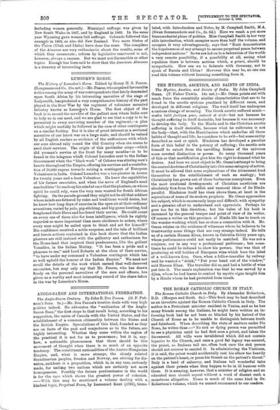THE MYSTICS, ASCETICS, AND SAINTS OF INDIA.
The Mystics, Ascetics, and Saints- of India. By John Campbell Oman. (T. Fisher Unwin. 14s. net.)—Mr. Oman points out with much force the essentially similar characteristics that are to be found in the ascetic systems practised by different races, and developed in different religions. The word itself has undergone a curious change of meaning. The Greek ascetic suffered much- snuita tulit fecilgue peer, sudavit et alsit—but not because he thought suffering in itself desirable, but because it was necessary to develop the body. To the Hindu and to the Christian ascetic suffering is itself desirable, because what he cultivates is not the body—that, with the Manichaeism which underlies all these habits of thought and life, he considers to be evil—but some entity described as soul or spirit. Hinduism has developed a peculiar form of this belief in the potency of suffering; the ascetic sets himself to extort from the unwilling Rulers of the universe some coveted distinction or power. So many thousand years of this or that mortification give him the right to demand what he desires. And here we must object to Mr. Oman's attempt to bring the central doctrine of Christianity into this same category of action. It must be allowed that some explanations of the Atonement lend themselves to the establishment of such an analogy; but Christianity has grown out of these barbarous conceptions. Even the most irrational developments of Christian asceticism are absolutely free from the selfish and unmoral ideas of its Hindu parallel. Hinduism itself has risen above them, at least in the aspirations of some of its modern prophets. Mr. Oman approaches his subject, which is enormously large and difficult, with sympathy and a genuine effort to understand and appreciate. Perhaps he goes too far in this direction; but the value of his book is increased by the general temper and point of view of its writer. Of course a writer on this province of Hindu life has to touch on the wonder-working which has so close a connection with it. Mr. Oman relates on the evidence of witnesses whom he believes to be trustworthy some things that are very strange indeed. He tells us of a certain Hassan Khan, known in Calcutta thirty years ago, whose performances could not easily be matched. He was not a conjurer, nor in any way a professional performer ; but some- times he could be induced to show his powers. One was that of producing at will bottles of European wine which bore the label of a well-known firm. Once, when a fellow-traveller by railway said he wanted a "drink," "Put your hand out of the window," said Hassan Khan. The traveller did so, and had a bottle of wine put into it. The man's explanation was that he was served by a djinn, whom he had learnt to control by mystic signs taught him by a Hindu whom he had protected from insult.


























































 Previous page
Previous page